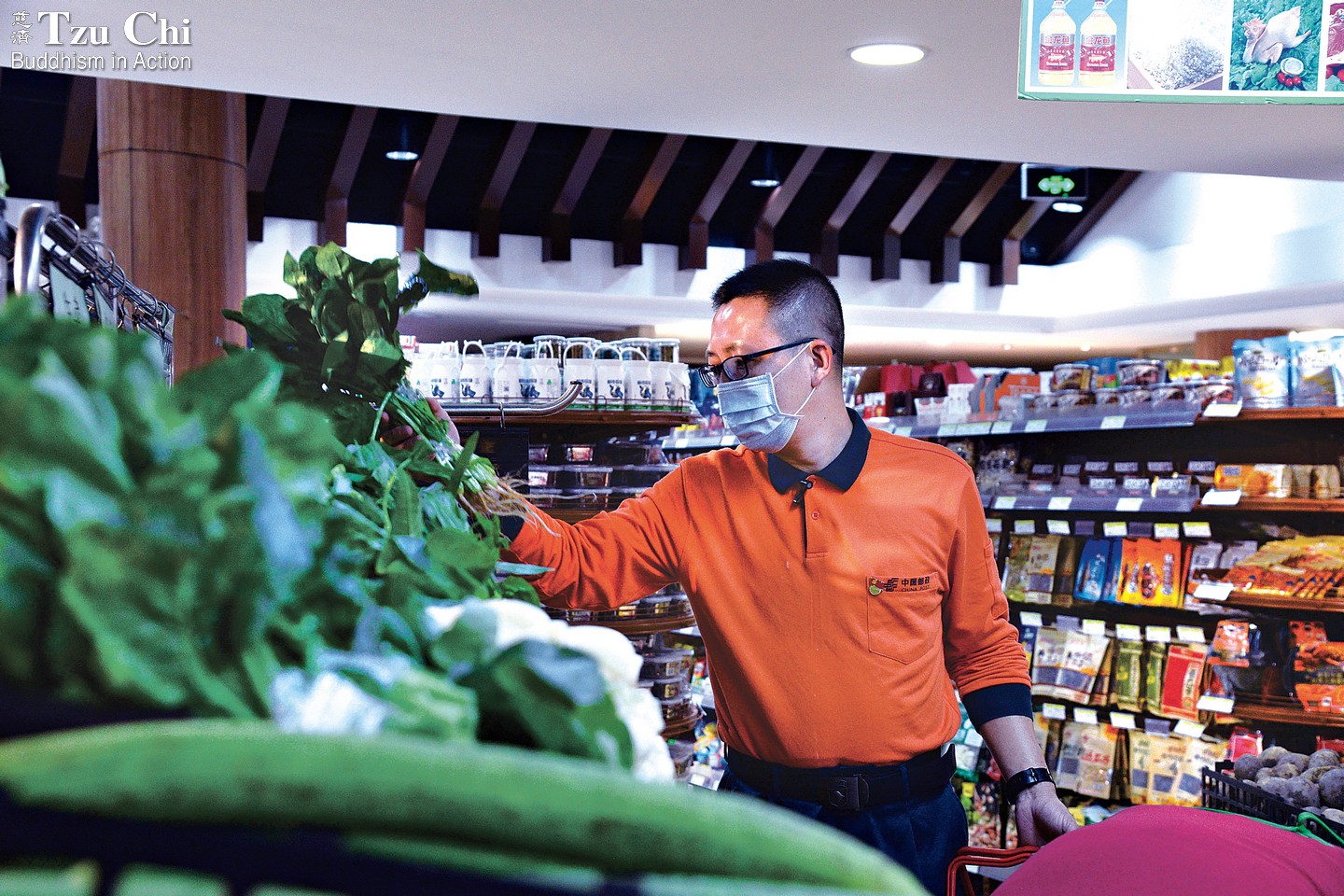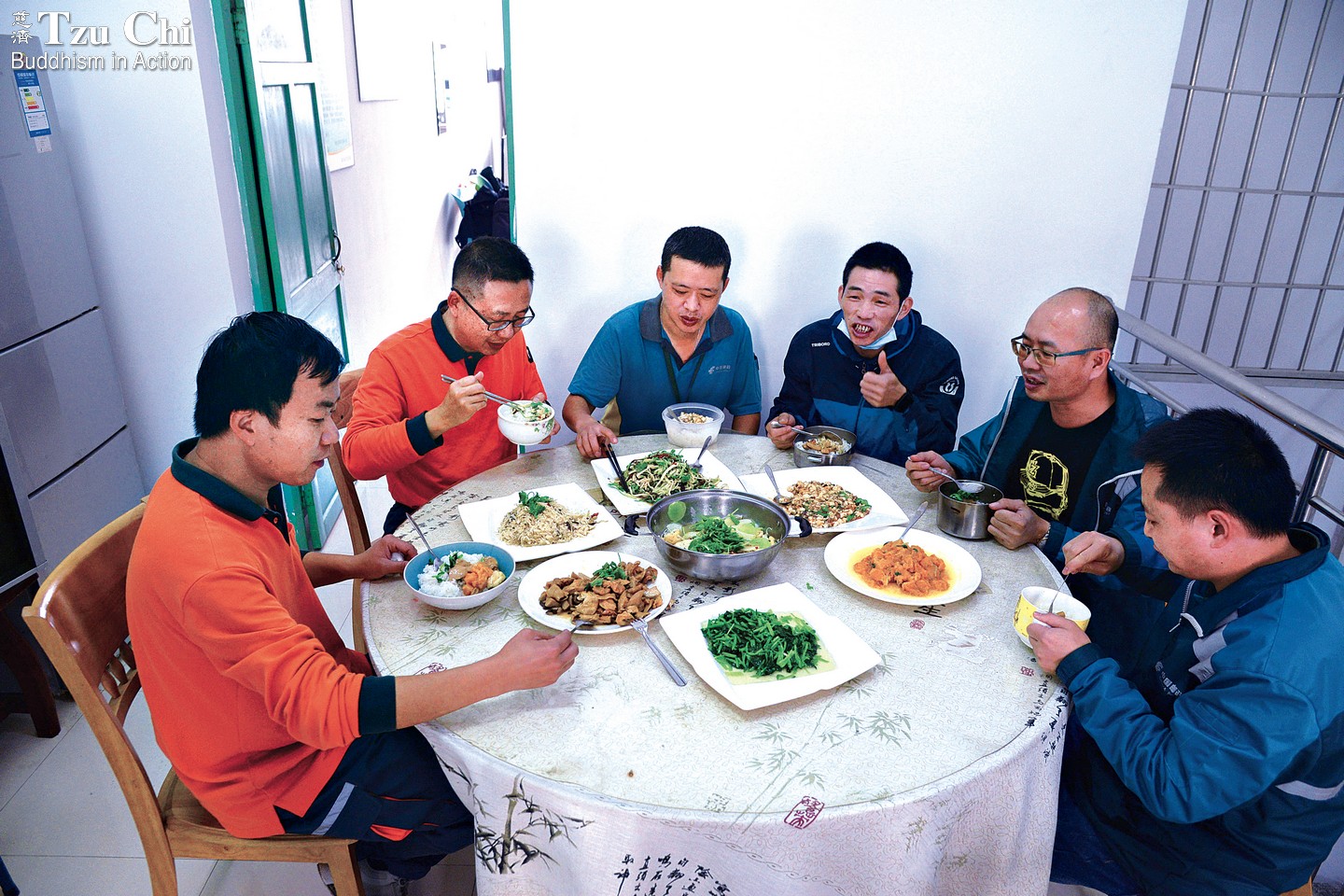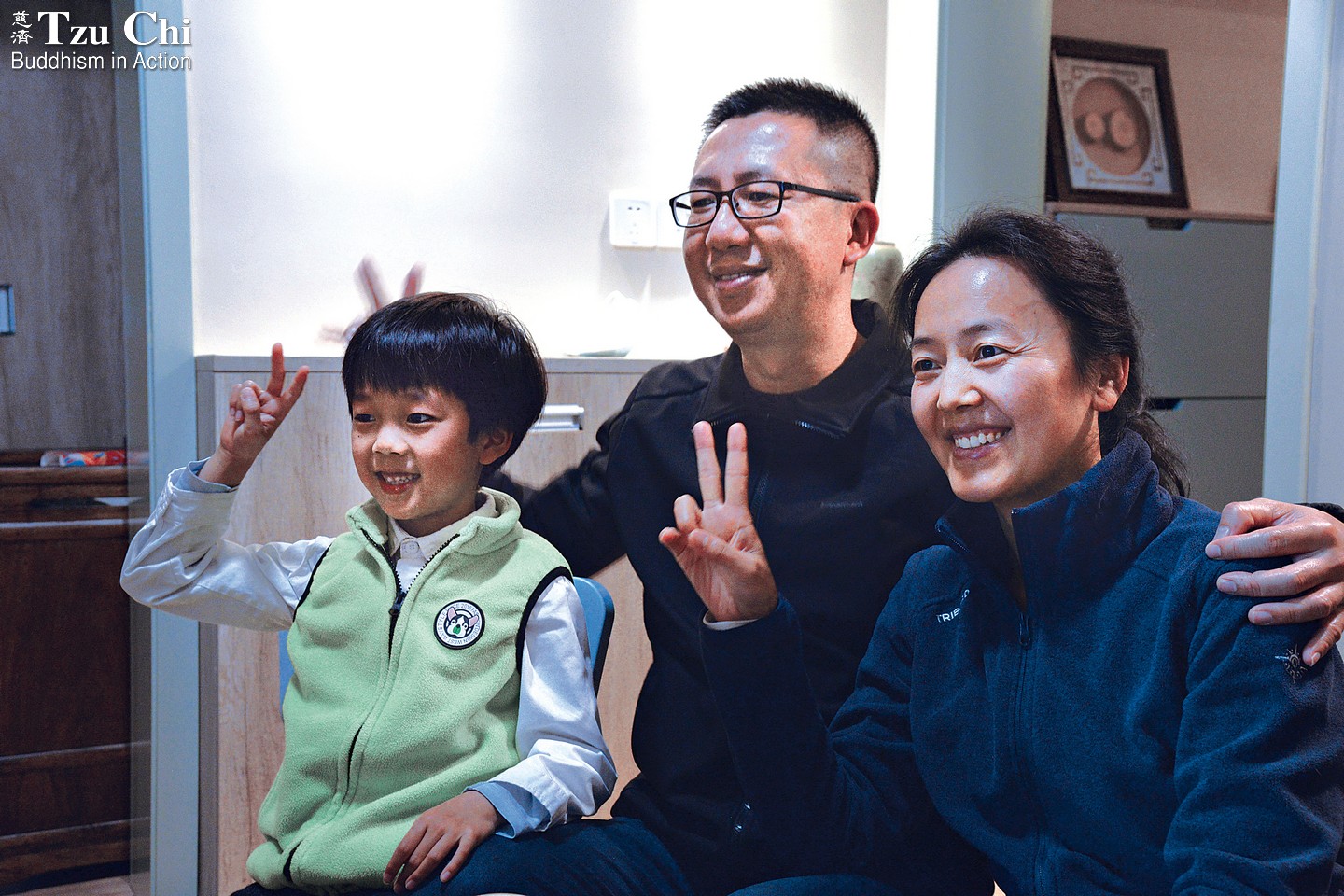By Zhang Ping
Abridged and translated by Wu Hsiao-ting
Photos by Wang Yanling
Following his young son’s lead, Xiao Bin became a vegetarian. Now Xiao, a post office manager and skillful cook, is winning over his fellow postal employees to vegetarianism too.

Post office manager Xiao Bin purchases ingredients to cook for his colleagues.
It is nearly 11 a.m. The sound of chopping vegetables emanates from the third floor of a post office on Gulang Island, off the coast of Xiamen, southeastern China. It’s followed shortly thereafter by the unmistakable sounds of ingredients being stir-fried in a wok. The aroma of food fills the air. Xiao Bin (肖濱), a manager at the post office, is cooking lunch for his colleagues. He typically prepares three or four dishes and a soup for his expectant coworkers.
Xiao is the manager of the mail intake and delivery department at the post office. The post office was one of the few places on the island that remained open when COVID-19 broke out in China at the beginning of the year. With the rest of the stores and restaurants closed, postal employees took to filling their stomachs with instant noodles and milk. But the same fare, day after day, soon got old; everyone began hankering for something different. That’s when Xiao started to cook for them.
From first to last, the manager does everything to put a good meal on the table. He shops for the ingredients, washes and prepares the food, and does the actual cooking. He fixes three meals for his colleagues each day he works, and prepares only vegetarian dishes. In order to get his colleagues to accept vegetarian food, he puts a lot of care in planning and cooking the dishes, including surfing the web for inspiration for his menu. His mapo tofu and potato curry dishes are his coworkers’ favorites.
Gulang Island covers an area of about two square kilometers (0.77 sq mi). It’s a pedestrian-only district; small electric buggies and electric government service vehicles are allowed, but all other vehicles are banned. All mail on the island is delivered by foot. Postal carriers typically walk seven or even eight kilometers in the course of their deliveries. Since the job requires so much physical activity, can eating vegetarian provide the mail carriers with enough energy to sustain them throughout the day?
Postman Deng Cunhui (鄧村輝) said, “I’ve eaten vegetarian for more than two months now in response to our manager’s appeal to adopt a vegetarian diet, but I haven’t felt any less energetic.” He said that the manager’s vegetarian food is very appetizing and that he eats two bowls of rice with the dishes every meal instead of his typical one bowl. Deng added another benefit of having the manager prepare the meals: “We used to eat separately but now we sit at a round table and eat together. It’s very homey, very warm.”
Xu Songhua (徐松華), another postman, nodded his agreement. “I feel healthier eating vegetarian. Even my mind has become less jumbled with negative thoughts. I used to feel that a meatless diet is bland, but now I’ve found that it doesn’t have to be so. Now that I know how delicious vegetarian food can be, I’ve cut down a lot on my meat intake.” When Manager Xiao isn’t working, Xu and the other workers cook mostly vegetarian too.

When COVID-19 broke out in China at the beginning of this year, almost all the stores closed on Gulang Island, southeastern China. The postal service, however, remained open. With nowhere to go to eat, postal employees took to eating instant noodles and milk.
A five-year-old’s choice
How did Xiao become a vegetarian? It all started with his son, Shunyu (順宇), now eight years old.
Shunyu was born thinner and frailer than most children. His parents wanted to improve his health, so they bought all kinds of expensive food for him to eat, thinking it must have a high nutritional value. They bought imported food, meat, deep-sea fish, lobsters, you name it. To their dismay, however, the expensive diet didn’t improve his health—it actually seemed to make it worse. Shunyu’s belly became swollen, he had difficulty moving his bowels, and he was more susceptible to colds and fevers too. A visit to the doctor identified the culprit: an unbalanced diet. The couple learned from the doctor and books they read later that they needed to balance their son’s diet. They began to reduce his meat intake, and the boy’s health gradually improved.
Shunyu was by nature very kind. When he visited the market and saw animals being killed there for food, he began to refuse to eat meat. Though meat didn’t completely disappear from their dining table, the whole family started to lean toward a plant-based diet because of Shunyu.
In October 2017, Shunyu, then five, took part in a “Little Vegetarian” event launched by Tzu Chi’s Jing Si Books and Café in Xiamen, in which participating children took up the challenge of eating vegetarian for 108 days for the sake of protecting the environment. Courses were offered to participants every Saturday afternoon on environmental protection, filial piety, etiquette, etc. Xiao accompanied his son to those courses, and at the invitation of Tzu Chi volunteers, he and his son started volunteering at the bookstore too. They also took part in other Tzu Chi activities. The more Shunyu participated in Tzu Chi events, the firmer his resolution grew to love the Earth and all living creatures. After he and his father took part in a performance in a Tzu Chi year-end blessing ceremony in 2018, he began to insist that his parents eat vegetarian with him.
Xiao Bin eats with his colleagues. He started cooking vegetarian for his coworkers during the COVID-19 outbreak. His colleagues love his cooking and the homey atmosphere of sitting down together for a meal. They say that despite the no-meat diet, they get enough energy to carry them through the day.

From meat-eaters to vegetarians
Relatives and friends challenged Shunyu’s decision to become a vegetarian. They claimed a vegetarian diet would adversely affect his health and growth, given that he was so young and still growing. But Shunyu had a comeback that was as effective as it was cute: the little boy would bend his arm and flex his biceps. “I’m very healthy!” he’d tell them. He likes in-line skating, playing ping-pong, and lifting small dumbbells, all of which help him keep fit.
A Tzu Chi volunteer asked him, “Does eating vegetarian affect your memory?” Shunyu paused for a second, then launched into a recitation from memory of the Heart Sutra. The sutra has 260 Chinese characters, and his recitation was correct down to the last character.
The volunteer continued, “Why did you choose to become a vegetarian?” Shunyu replied: “I don’t want to cause animals to be hurt. I’m used to a vegetarian diet now. Eating vegetarian makes me feel great.”
“How long will you remain a vegetarian?” the volunteer pursued.
“For the rest of my life!” the youngster answered in earnest.
When Shunyu’s grandfather learned that his son’s entire family had become vegetarian, he nagged and questioned them about the wisdom of their decision. He was especially worried that Shunyu wouldn’t be getting enough nutrition. Every time Shunyu visited and ate with his grandparents, Shunyu’s grandpa always put meat in the boy’s bowl, but Shunyu steadfastly refused to eat it. His grandfather only came around when he saw how Shunyu’s health was getting better with a vegetarian diet. That was when he stopped grumbling about it.
Now Shunyu’s grandmother cooks only vegetarian when the boy visits with his parents. Shunyu’s mother, Yan Shuling (閆書玲), says that since her son adopted a vegetarian diet, his immunity has gotten better. He falls ill a lot less often than his schoolmates. Even when he catches an occasional cold, he recovers in a few days without having to take any medicine. Now they no longer have to worry about his health.
There are other benefits that have grown from Shunyu’s vegetarian diet too. One is that he has learned to cherish food more. He has developed the good habit of finishing every morsel in his bowl or on his plate to prevent any food from going to waste. His mother is very happy to see his change.
Shuling’s happiness is not just from seeing her son thrive. She and Xiao used to fight a lot due to their differences in personalities and living habits. Their disagreements used to make Shuling very upset—to the extent that her health was affected and she often felt under the weather. However, after Xiao accompanied his son to the “Little Vegetarian” courses and began taking part in Tzu Chi activities—including study groups and making visits to the needy—he softened a great deal. The couple rarely argues now.
A smile spread across her face as Shuling said, “Ever since he [Xiao] joined Tzu Chi and became a vegetarian, he seems to have undergone a transformation. He became more spirited and says ‘thank you’ a lot. His hours became more regular and he often gets up very early to read. I’m very grateful to Shunyu for leading his dad to Tzu Chi and also for transforming our family into vegetarians. The atmosphere in our family has become very positive. I really like how our family is now.”
Xiao talks about the many benefits he has reaped from becoming a vegetarian. He says that his health has improved, that he’s become more peaceful at heart, and that his peacefulness has led him to be more thoughtful towards others. As a result, the atmosphere in his family has become more harmonious. He and his wife get along very well now. To an outsider, their love for each other is obvious in the way they interact with and look at each other.
Xiao often shares with his colleagues at work how eating vegetarian over the past two years has changed him physically and psychologically. In addition to supervising his coworkers to help make sure that they provide the best service to the people they serve, he urges his colleagues to take good care of their physical and emotional wellbeing. “We’re getting along better than before,” the manager said. “When I talk to them about work-related matters, their attitudes are more positive and they are more willing to share with me what they think.”
Shunyu has now stuck to a vegetarian diet for three years. Because of him, his parents became vegetarian, and his father has helped his colleagues warm to vegetarianism. It all started with the boy’s love for all living creatures and the Earth, and like a ripple in a pond, the effects of that love are spreading.

Xiao Shunyu poses with his parents. Under the boy’s influence, his parents became vegetarians and have happily reaped many benefits from it.



